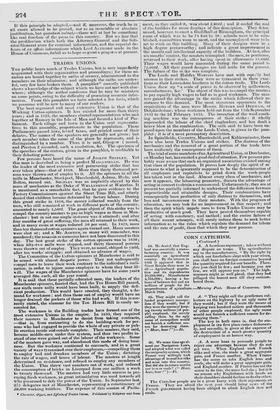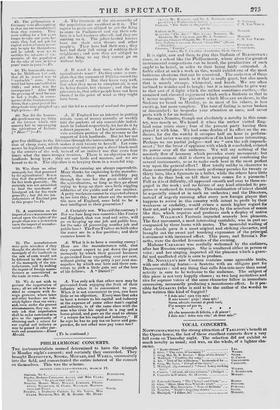CORN CATECHISM.
(('ontinued.)
A. A facetious argument ; taken without any dispute on terms. The agriculturists say to the manufacturers, "By the right by which our forefathers slept with your wives, you shall have no foreign commerce beyond the quantity required for our benefit. There- Are you shall be few; and because you are few, we will oppress you on." The high- waymen might as well plead, that they had pillaged the honest men till they outnum- bered them.
65. They might call the landed proprietors monopo- lists if they would; but if they were the means of keep- ing twenty millions [of peo- ple] employed, the merely calling them by the ugly name of monopolists would not furnish a sufficient rea- son for destroying them. (" Hear, hear! ")--lb.
66. We some time ago al- tered our Navigation Laws, and adopted what was called the reciprocity system, which France very willingly took advantage of to send her silks and wine into this country. But did she in return receive our inm or coals? (" Hear, hear, hear! ")—Ib. A. "They might call the gentlemen col- lectors on the highway by an ugly name it they would ; but if they were the means of keeping two hundred ostlers and thousands of other people employed, the ugly name would not furnish a sufficient reason for de- stroying them."
The key in both cases is, that the em- ployment in the first place comes dishonest- ly, and secondly, is given at the expense of the destruction of a much greater quantity of employment in an honest way.
A. A mere hoax to persuade people to reject one advantage because they do not get two. When England took. French silks and wine, she made a great aggregate gain, and France another. When France has the sense to take English iron and coals, she will make a great aggregate gain, and England another. If France has not the sense to do this, the more fool she ; but it is no reason why Englishmen with heads on their shoulders should decline to do the other.
The Corn-law people are in a great hurry with their arguments on France. They are afraid the next post should bring news of the French government having been obliged to admit English iron and coals.
67. The philosophers o Germany were all conspiring to shut out our mannfactures from that country. They were willing for a few years longer to take our yarn, be- cause they bad not got the capital and in rehinery neces- sary to spin for themselves; and he asked, were we to sacrifice the interests of six- sevenths of the population for the sake of two or three years' trade in yarn A. The interests of the six-sevenths of the population are sacrificed as it is. The rogues LI grain are obliged to get the King to come to Parliament and say their rob- bery is a had business after all, and they are starving on it. The jolter-headed knaves have cut their own throats and other people's. They have had their way ; they have had their full swing of robbing their neighbours ; and now they are obliged to get the King to say they cannot go on without help.
A. If wool is dear now, what do the agriculturists want ? Do they come :o coin- plain that the measure of 1825 has raised the price of wool ? But they know very well, that what they mean to complain of, is not its being dearer, but cheaper ; and that the grievance is, that other people have not been cheated in the price of wool as they might have been.
(" Hear ! b. 69. Nor did the honour-. A. If England has an interest in putting able gentleman say any thing certain sums of money annually or weekly of the interest which this into the pockets of any conceivable nidivi- country had in encouraging duals in Ireland respectively, let her do it by the agriculture of Ireland. direct payment. Let her, for instance, de- vote a certain portion of the revenue to the support of Irish landlords. But let her not give five shillings to the Irishman through the intervention of a prohibi- tion of cheap corn, %%inch makes it cost twenty to herself. Let com- merce be legalized, and the commercial interests pay a direct black-mail to the owners of the soil, instead of an indirect one that costs four times what the moss. trooper receives. There is no objection to the landlords being kept ; they are our lords and masters, and we are bound to do it. The objection is to keeping them in a wasteful way.
15. Was there no other monopoly but that possessed by the agriculturist! It was true that the petitinn asked for free trade generally. He certainly was not astonished to hear the merchants of Liverpool ask for free trade generally ; but did the ma- nufacturers of England join in this prayer ?—/b.
16. A restriction on the import of corn was no more an inroad upon tile rights of the people than was a restriction upon the import of manufac- tured cotton. —Ib.
17. The manufacturers were quite mistaken if they thought the abolition of the monopoly of the landlords in the sale of corn would not he followed by the abolition of the monopoly of the ma- nufacturers, and by making the import of foreign manu- factures as unrestricted as the trade in corn. —Ib.
18. We do not wish to prevent the importation of corn; all we ask is to be en- abled to compete with fo- reign growers, whose taxes and other burdens are infi- nitely lighter than our own ; and, even under the present circumstances, they say, we only ask that importation shall be so far restricted as to give us the opportuuity- of obtaining such a return for our capital and industry as may be gained in other pur- suits and avocations—Essex A. The cunning are always supersubtle. Many thanks for explaining to the manufac- turers, that they must infallibly pay through the nose for the great robbery of the agriculturists, so long as they go about trying to keep up their own little niggling robberies of the public and of one another. A petty workman cannot be expected always to see into this; but where are the mercan- tile. men of England, once held to be a race intelligent in their generation ?
A. Certainly not. Who said the contrary ? But see how long two countries like France and England, that can read and write, will go on keeping up one job and public loss, for the sake of preserving another job and public loss ? The Free Traders on both sides the water are in a fine position ; and their enemies know it.
A. What it is to have a cunning enemy ! Here are the manufacturers told, that they cannot expect to put down the great monopoly by which their general business is prevented from expanding cent per cent, without giving up the petty 5 per cent mo- nopolies by which one here and there con- trives to pick a little gain out of the loss of his fellows. A " Daniel !"
A. You only ask that other men may be prevented from enjoying the fruit of their industry when it is convenient to you. When it is not convenient to you, you have little or no objection. Every man that asks to have a return to his capital and industry at the expense of some other man's capital and industry, is of the same class with the man who vests his capital in a nag and a horse-pistol, and goes on the road to obtain "a return for his capital and industry." If he says he has to pay tax on horse and gun- powder, do not other men pay taxes too?
Herald. (To be continued.)





















 Previous page
Previous page